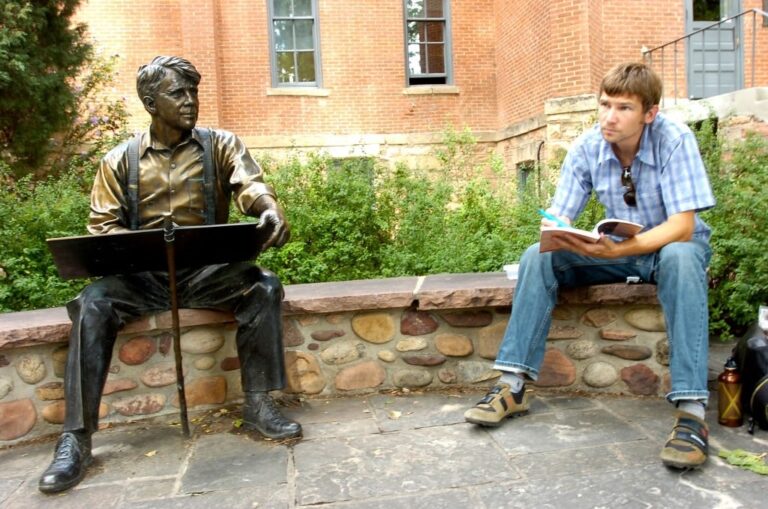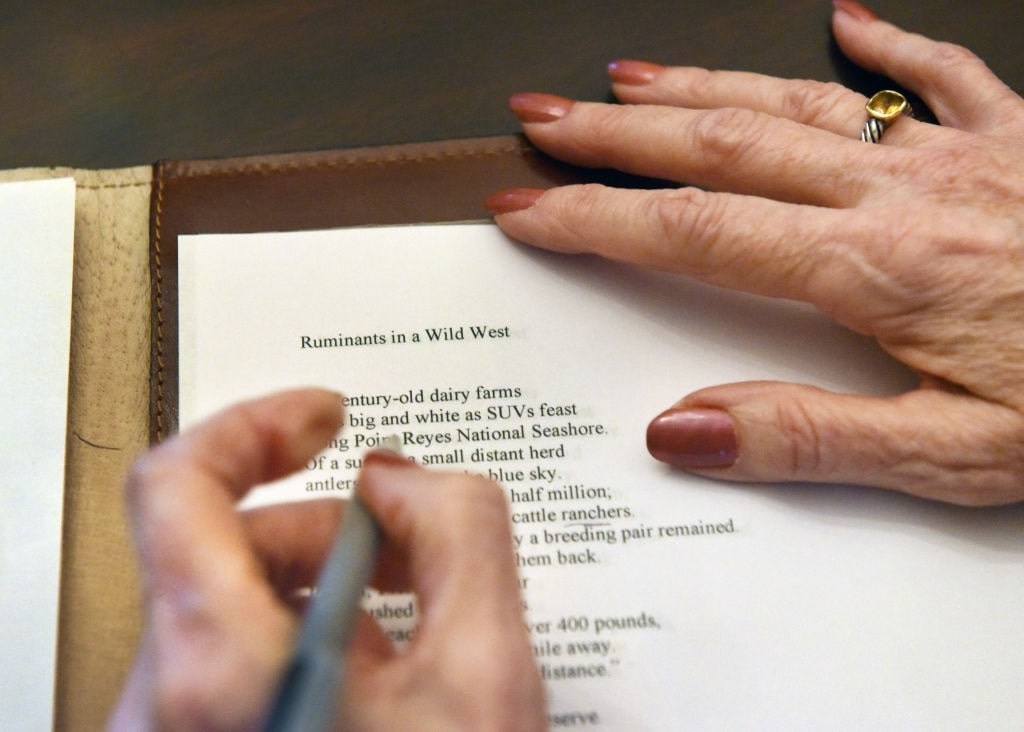Roses Are Red, Violets Are Blue – April Celebrates Poetry, Too
April is National Poetry Month.
By: Kirsten Brooker | April 15, 2024 | 926 Words

Robert Frost statue (Photo by Paul Aiken/Digital First Media/Boulder Daily Camera via Getty Images)
April welcomes the beginning of spring, sometimes includes the celebration of Easter, and also celebrates the world of poets and poetry. National Poetry Month was established by the Academy of American Poets in 1996 and is celebrated every year throughout the month of April. Poetry has played a dynamic role in American culture. Libraries, schools, and national poets dedicate this month to highlighting the importance of artistic writing.
The Nation Celebrates Poetry
There are many scheduled events throughout the month of April that contribute to the celebration. New York, for example, hosts several reading events, including Poetry in Your Pocket at the Guggenheim, the largest literary celebration in the world. At this event, three of the museum’s Poets-in-Residence hand out poems to attendees. Additionally, visitors can walk through the Guggenheim Museum and enjoy 10% off items sold at the museum’s store.

(Photo by John Carl D’Annibale /Albany Times Union via Getty Images)
In addition to nationwide events, the Academy of American Poets proudly displays the National Poetry Month poster, offers different ways for teachers to incorporate poetry into their classrooms, and provides ways for those interested to celebrate from home.
Iconic American Poets
Many of the most notable American poets come from the 19th and 20th centuries. Here are just a few:
Edgar Allan Poe (1809-1849)
Edgar Allan Poe was a writer, author, poet, and writing critic. He was known for writing dark, gothic pieces but was also a composer of romantic tales. His most famous poetic works include ‘The Raven’ and ‘Ulalume’. Both poems are centered around the loss of a loved one and reveal the dark and sad truths of living life without one’s soulmate.
To Helen
By: Edgar Allan Poe
Helen, thy beauty is to me Like those Nicean barks of yore,
That gently, o’er a perfumed sea,
The weary, wayworn wanderer bore
To his own native shore.
On desperate seas long wont to roam,
Thy hyacinth hair, thy classic face,
Thy Naiad airs have brought me home
To the glory that was Greece
And the grandeur that was Rome.
Lo! in yon brilliant window-niche
How statue-like I see thee stand,
The agate lamp within thy hand!
Ah, Psyche, from the regions which Are Holy Land!
Maya Angelou (1928-2014)
Maya Angelou was a poet who wrote and published several autobiographies and was a civil rights activist. She was a strong woman who was successful in many ways. Regarding her poetry, Angelou is recognized for several pieces. She was chosen to recite “On the Pulse of Morning” at the inauguration of former president Bill Clinton in 1993. Arguably her most recognized poem, “Still I Rise,” is a tribute to women who, in the face of adversity, rise above and stay strong in their will to survive.
Racial inequality in America was a subject in many of Angelou’s writings. Her poem “These Yet to Be United States” focuses on the inequalities she faced as a black woman growing up in the early 20th century.
These Yet to Be United States
By: Maya Angelou
Tremors of your network
cause kings to disappear.
Your open mouth in anger
makes nations bow in fear.
Your bombs can change the seasons,
obliterate the spring.
What more do you long for ?
Why are you suffering ?
You control the human lives
in Rome and Timbuktu.
Lonely nomads wandering
owe Telstar to you.
Seas shift at your bidding,
your mushrooms fill the sky.
Why are you unhappy ?
Why do your children cry ?
They kneel alone in terror
with dread in every glance.
Their nights [‘rights’ ? – Schrift nicht lesbar] are threatened daily
by a grim inheritance.
You dwell in whitened castles
with deep and poisoned moats
and cannot hear the curses
which fill your children’s throats.
Robert Frost (1874-1963)
Robert Frost was born in San Francisco but was raised in Massachusetts. Trees, woods, and the outdoors were common topics in Frost’s poetry. Several of his writings referred to his childhood and upbringing in rural America. Though, he did slip in a couple of pieces that spoke of urban life and the city. He was the first poet – the second being Maya Angelou – to be invited to recite at a presidential inauguration in 1961. Frost prepared a special poem to present, titled, “For John F. Kennedy His Inauguration,” though he was unable to read it due to the brightness of the sun on that day. Instead, he recited one of his original works, which he had memorized, named “The Gift Outright.” That particular poem is often coextensive with JFK’s inauguration.
Frost is dubbed by many the greatest poet of all time. Though a suggestive statement, it signifies the artistic brilliance of his work and the prominence and value of his writings still today.
The Gift Outright
By: Robert Frost
The land was ours before we were the land’s.
She was our land more than a hundred years
Before we were her people. She was ours
In Massachusetts, in Virginia,
But we were England’s, still colonials,
Possessing what we still were unpossessed by,
Possessed by what we now no more possessed.
Something we were withholding made us weak
Until we found out that it was ourselves
We were withholding from our land of living,
And forthwith found salvation in surrender.
Such as we were we gave ourselves outright
(The deed of gift was many deeds of war)
To the land vaguely realizing westward,
But still unstoried, artless, unenhanced,
Such as she was, such as she would become.
















